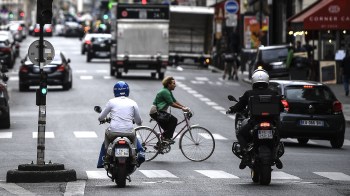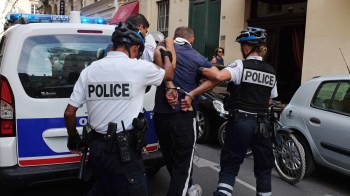Vandals focus on French police cameras
TEXT OF STORY
BOB MOON: The idea of catching criminals on camera is more popular than ever. The Brits have spent billions to keep a remote eye on citizens. But today a senior detective is making headlines there, claiming surveillance cameras have barely made a dent in crime.
In France, you might say they’ve actually caused it. Since speed cameras were introduced there in 2003, vandals have smashed them, blinded them with paint or taken aim with rifles. Lately, a group calling itself the Armed Revolutionary Nationalist Faction — or F’NAR — has turned to blowing them up. John Laurenson reports from Paris.
JOHN LAURENSON: Cars slowing to 30 miles an hour as they enter the little village of Perroy-les-Gombries, north of Paris. A speed camera surveys each one with a glassy eye, ready to photograph offenders in a flash of white light. This camera’s brand new. Its predecessor was blown up last month. One of a string of 10 similar attacks.
In a cafe nearby, there’s a good deal of support for the attackers, and people are not surprised a replacement camera was installed so quickly.
Man 1 [translation]: It’s the biggest-earning speed camera in the area. Over 30,000 people have been fined because of it. It’s good this group destroyed it. If they could do it again, that would be even better.
Man 2 [translation]: I have to do a lot of driving for my job, and I pay a lot in road tolls to use the motorways. And still I’m not free to drive. Speed cameras? We should burn the lot of them.
In a letter published in a recent edition of Paris Match magazine, the FNAR reiterates its demands — removal of all speed cameras, lower taxes and a $6 million payoff. The group also wants illegal immigrants to be deported and a price cap on basic consumer goods.
But the FNAR are not the only ones with a motive to blow up the cameras. Jean-Baptiste Iosca is a lawyer who specializes in motoring offences.
Jean-Baptiste Iosca [translation]: Between 90 [thousand] and 200,000 people lose their driver’s licenses each year in France, with huge social consequences, because 40 percent of people who lose their driver’s license lose their job. The people suffering most from this are not people the people driving badly, but the people who drive a lot.
Like the cafe customers, Mister Iosca believes money is behind the cameras. Speed cameras cost $150,000 each but generate, on average, twice that in revenue in a year. According to the French government, speed cameras brought in $700 million in 2007. They also saved lives.
Speed cameras are at the heart of an effective government campaign to improve road safety. A campaign backed by the League Against Road Violence, which represents the families of car-crash victims. Its president, Chantal Perrichon, says the FNAR attacks are disgraceful.
Chantal Perrichon [translation]: There is no excuse for attacking a system that has saved thousands of lives in France. Automatic speed controls and fines are the main reasons we’ve been able to bring down road deaths by 42 percent since 2002.
Mrs. Perrichon is delighted the government plans to install another 2,500 speed cameras over the next five years.
I drive to another cafe down the road from the latest FNAR attack. There’s another speed camera just outside. The owner tells me three youths destroyed it on the very day it was installed.
CAFE OWNER [translation]: They smashed the lens, poured gasoline inside and set it on fire. My opinion is that speed cameras can be useful but not always, when they’re put in places where there’s no particular accident danger. Then they’re just big piggy banks for the government.
He speaks with a slur. Due, he says, to a motorcycle accident. He broke his jaw. Spent a month in a coma. After being hit by a speeding car. If even victims of excessive speed can be cynical about speed cameras, Mrs. Perrichon and the French government really have a lot more convincing to do.
In Perroy-les-Gombries, I’m John Laurenson for Marketplace.
There’s a lot happening in the world. Through it all, Marketplace is here for you.
You rely on Marketplace to break down the world’s events and tell you how it affects you in a fact-based, approachable way. We rely on your financial support to keep making that possible.
Your donation today powers the independent journalism that you rely on. For just $5/month, you can help sustain Marketplace so we can keep reporting on the things that matter to you.


















